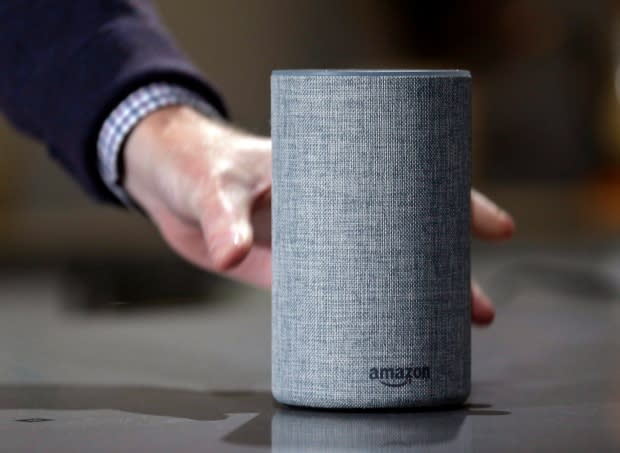Amazon faces tough questions on Parliament Hill over privacy practices, ad targeting

Tech giant Amazon was in the hot seat on Parliament Hill Wednesday over how its 'smart speakers' target ads at users and occasionally record household conversations.
Elected officials from several countries joined MPs on the House of Commons privacy and ethics committee today for a third day of questioning major information tech and social media firms about big data, privacy and democracy. But one of the strongest attacks on Amazon came not from the MPs, but from a representative of another tech company.
Mark Ryland, director of security engineering for Amazon Web Services, tried to reassure the committee that its smart speaker devices only activate in response to so-called 'wake up' words.
'I was shocked'
Moments later, Alan Davidson — vice-president of global policy, trust and security for Mozilla, which developed the Firefox browser — told MPs he was shocked to discover that the Amazon Echo device in his home had recorded his children.
"I was shocked, honestly, and my family was shocked to see these recordings of our young children from years ago that are in the cloud and stored about us," Davidson told today's gathering of the International Grand Committee, a collaboration between politicians from Canada, the United Kingdom, Germany, Ireland, Singapore and several other countries.
"It's not to say that something was done wrong or unlawfully. It's actually wonderful to see this kind of level of transparency. But users have no idea. I think that many users have no idea that this data is out there and they don't know how it's going to be used in the future, either.
"As an industry, I think we have to do a better job of giving people better, more granular consent about this."
Davidson said it's possible for governments to draft laws that would better regulate big tech companies.
Amazon also faced tough questions about the way it can use searches on its Alexa or Echo smart speakers to target users with ads associated with their searches.
Targeted advertising
"If you have asked about the weather in Bermuda and then you go on Amazon, you might be pitched with a holiday book about Bermuda?" asked Irish MP James Lawless.
"It's theoretically possible," Ryland replied.
Ryland said information gathered by Alexa or Echo devices is added to the user's profile along with other information, such as lists of items they've bought on Amazon. He said users are aware that their information is being used by the company and they can check the information gathered about themselves on Amazon's website.
While some of the companies that have appeared before the committee have said they're willing to accept new laws governing their behaviour — and would like to see the European Union's tough new privacy law, the GDPR, extended to other countries — Ryland said existing competition laws are sufficient and the GDPR is good in principle but cumbersome.
Ryland said Amazon respects domestic laws in the countries where it operates.
Amazon also faced tough questions from NDP MP Charlie Angus about some of its employment practices, citing reports of anti-union practices and the company using an artificial intelligence system to fire workers for failing to meet productivity standards.
Ryland said Amazon treats its workers well and humans review performance data before an employee is dismissed.
The committee also heard Wednesday from Apple and Microsoft, which outlined steps they have been taking to protect the data of their users.
British MP Damian Collins — who hosted the first meeting of the committee in the wake of the Cambridge Analytica scandal — said the hearings in Ottawa underline the need for governments to regulate big tech companies.
"For me, the lesson of the last two days is that we have to continue to work together to make sure we have these systems in place, and to have regulators with the powers to go into big companies and investigate concerns that they may be in breach of data protection law, or not doing what they can to act against harmful content," he said.
'A profound shift'
Angus said the committee has moved the yardstick over the past six months but its work is not yet done.
"What about the democratic rights of citizens? What are we going to do with artificial machine intelligence making decisions for our lives without our input?" he asked. "What are we going to do with facial recognition technology and holding massively powerful digital corporations to account?
"That's a profound shift in the political discussion and it's happening around the world."
Elizabeth Thompson can be reached at elizabeth.thompson@cbc.ca

